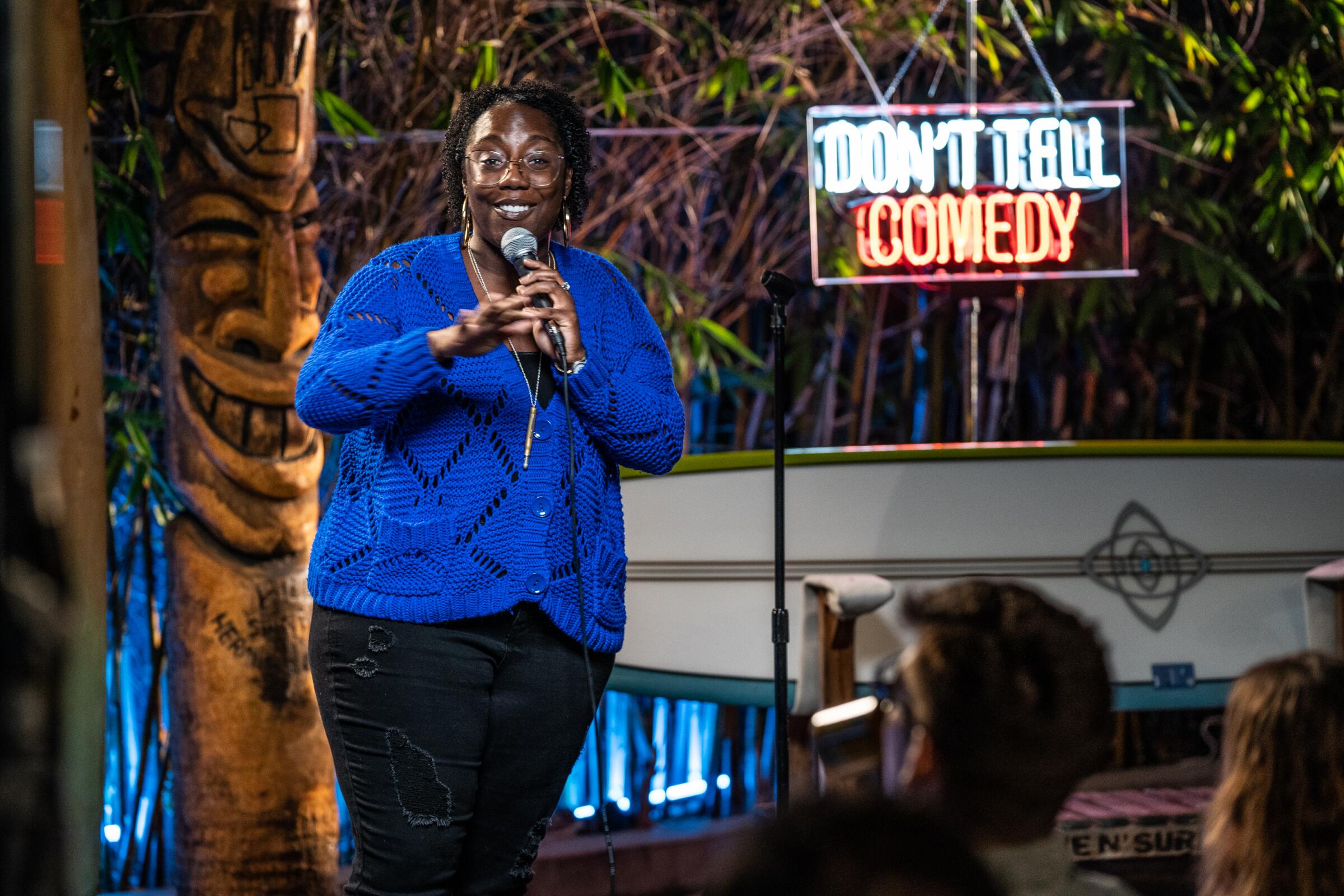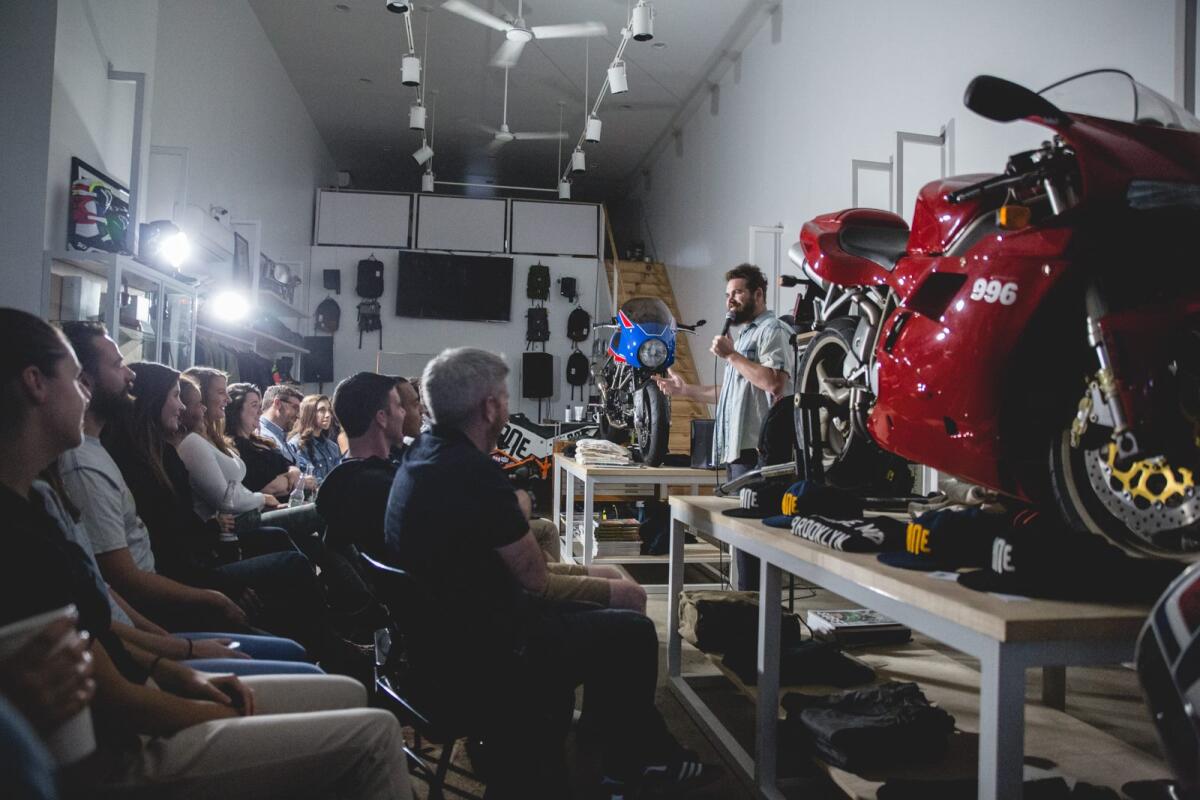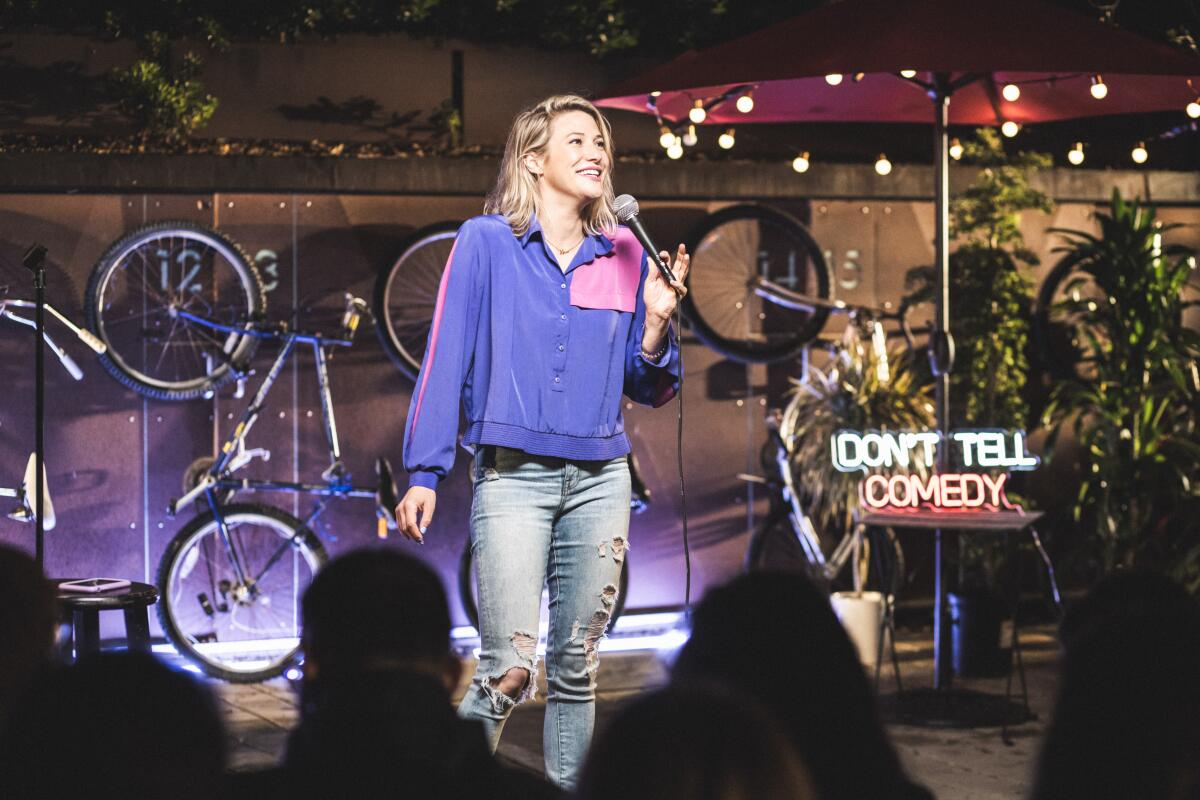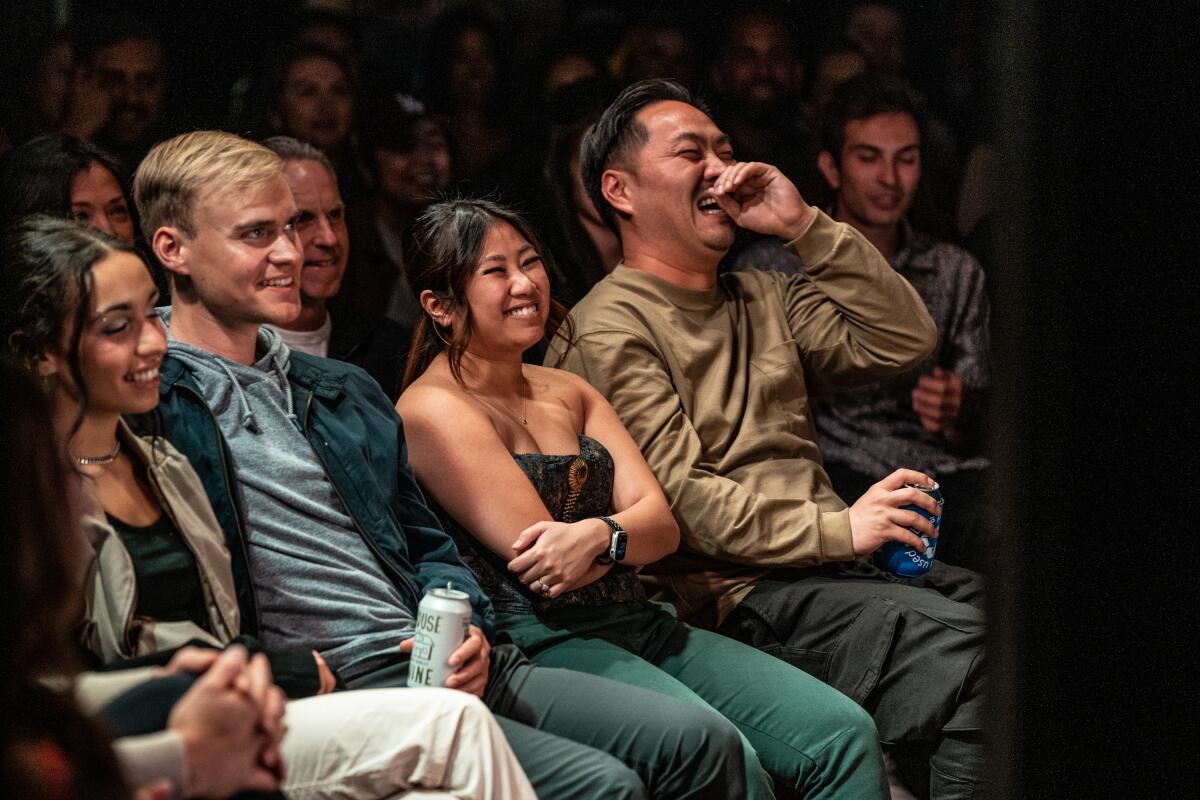The biggest entertainment stories
Get our big stories about Hollywood, film, television, music, arts, culture and more right in your inbox as soon as they publish.
You may occasionally receive promotional content from the Los Angeles Times.

One of the first suggestions Felicia Folkes found on Google when she searched “fun jobs to have” was to work at a comedy club.
So at age 19, that’s what she did. Originally from Inglewood, Folkes applied for and got an internship at Westside Comedy Theater in Santa Monica. Over three years, that internship turned into hosting open-mic nights and running improv shows. That’s around the time she met fellow stand-up Kyle Kazanjian-Amory, who, in 2015, had recently moved to Los Angeles from Orange County and was going to open mics five times a week and volunteering wherever he could.
Amid the hustle, Folkes and Kazanjian-Amory noticed certain occupational hazards in the comedy world. Folkes saw how live production in many comedy spaces would be sorely lacking: no mics on a large stage, poorly recorded audio, people walking in front of the camera during a set. And this would happen “on a daily basis,” she says. Kazanjian-Amory, meanwhile, felt the financial strain of constant nights out, between clubs’ two-drink minimums, parking and ticket costs.
“It became very unsustainable for me to keep going to clubs to see shows,” Kazanjian-Amory says. “I started to meet a lot of comedians doing stand-up, and people would do shows wherever, like in their backyard. It felt like a house party vibe. It was casual, people could bring their own drinks, and you’d meet somebody new. It was so different from a club, where the experience felt more transactional and less personal.”

With a more intimate, affordable setting in mind, in 2017 Kazanjian-Amory founded Don’t Tell Comedy, an independent series of secret, pop-up comedy shows with unannounced lineups in unlikely locations around Los Angeles. DTC is celebrating its five-year anniversary with 40 pop-up shows happening across the country this weekend and next — a far cry from its DIY beginnings. In the early days, Kazanjian-Amory would produce secret comedy nights wherever possible: in friends’ living rooms and backyards, mostly. “It was all purely word of mouth,” he recalls. (The precise location of each show would be sent to ticket holders at noon the day of.) “We needed every show to be amazing.”
Six months after hosting shows in and around L.A., Kazanjian-Amory took the franchise north to San Francisco, setting up shop — again — in a friend’s living room. “I borrowed chairs from my dad’s office,” Kazanjian-Amory says. “And it just worked. We got a write-up in Time Out SF and ended up selling out four weeks of shows in advance. It was doing better than L.A. almost immediately. Then I drove up with chairs and a PA system to Portland and Seattle, again staying on friends’ couches and relying on connections from people I knew in the area. And it just kept working.”
Kazanjian-Amory has since expanded DTC’s stages from residential spaces to all types of small-business venues. Today, a typical DTC show might take place anywhere from a historic mansion to a candy store, rooftop or rock-climbing gym. Sets also take place in more than 50 cities across the country, with local producers sourcing locations and booking talent. Kazanjian-Amory has turned his focus from performing to running the entire enterprise. “I don’t miss performing because I get to hang out with comedians all the time and create opportunities for comedians that I love and respect,” he says.
DTC still prioritizes small, personable settings but has been innovative in expanding its visibility, both online and in person. Because a secret show only allows for so much promotion, Kazanjian-Amory has tried to cement a reputation for booking high-quality acts and giving comedians an inviting performance space where they can meet new fans and network with fellow stand-ups.
“We create a welcoming environment for comedians and audience members,” Kazanjian-Amory says. “We stay in our lane, which is outside of the traditional system. We’re an organization primarily run by comedians in different cities. The most important thing is that everyone has a great experience. We focus on creating the best possible experience for everyone.”
Though DTC has booked its share of high-profile names, including “Saturday Night Live’s” Michael Che, “SNL” writer Sam Jay, Iliza Shlesinger, Ali Wong and Nikki Glaser, Kazanjian-Amory is passionate about providing a platform for rising acts such as Folkes, who praises DTC’s production standard and has seen her social media numbers take off thanks to the organization’s YouTube channel. “The production is just next level,” she says. “They curate a great audience who want to listen and want to have a good time. Their locations are always really nice, very clean and comfortable. I trust them creatively. They’re not gonna try to make you look bad, or make you do anything [you don’t want to do]. It’s really fun to work with them.”
Thanks to a filmed DTC set at Dive N’ Surf in Redondo Beach, Folkes booked a slot at the most recent Netflix Is a Joke festival. (DTC currently boasts nearly 1.5 million TikTok followers and a quarter-million YouTube subscribers.) “I’ve been here for 10 years, so [DTC] really spreads your reach,” she says. “Not even just with fans, but also industry-wise.”

Atlanta-based comedian Katherine Blanford has likewise seen her following explode since she began doing stand-up with DTC. After posting some clips online, Blanford received a message via Instagram from Kazanjian-Amory asking if she’d like to perform a set for DTC in Santa Barbara. “It was a great excuse to get out of this wedding,” Blanford cracks, before adding, “I didn’t realize the level of production they put into this stuff. I didn’t have to get there until 7:30, but the camera crew had been getting there all day. There’s like four cameras, a camera on a dolly, they had audio people circling the place. It’s a real production.

“My social media has blown up,” she adds. “I’m still part-time nannying, but I’m getting to the point where I’m going to be able to totally support myself through comedy. People are contacting my website and trying to book me for gigs that pay my rent for the month. David Spade saw my clip, and now I’m opening for him in Jacksonville tomorrow. It’s career-changing. I did a show last night in New York City, and I started a bit and a girl yelled out the punchline because I put it online — it was one of the Don’t Tell clips.”
Despite its overwhelming success, DTC struggled to stay afloat when COVID-19 hit in early 2020. “It was brutal,” Kazanjian-Amory says. “Our whole business was live events.” Like a number of other live-event organizations, DTC quickly pivoted to expanding their digital footprint, creating online experiences aimed at engaging audiences and providing opportunities for comics, who were also out of work. “We created this trivia format where we had upwards of 2,000 people on the livestream doing this interactive trivia experience with comedians, creating funny videos as questions, and people could answer on their phones.
“And then we started getting hit up by companies to see if we could do corporate events for team-building exercises,” Kazanjian-Amory continues. “Because we were just trying to create some fun experiences during the pandemic, it opened up this whole other business for us where we could accomplish a bunch of things, creating fun experiences for people, creating paid opportunities for comedians when there were not many out there. It’s still something that we’re doing to this day, because companies have shifted remotely.”
Amid the pandemic, longtime advisor and digital comedy content producer Brett Kushner was instrumental to helping DTC thrive in the digital ecosystem. “My biggest role ended up helping figure out how we actually make this into a legitimate business with strategy and long-term planning,” Kushner says. “One thing we built out is the ability to connect comedians to their audiences. We’ve tried to build out some robust tools and make our show a little bit more professional. After you come to one of our shows, you’ll get an email, headshots, and links to all the social handles for all the performers you saw, and even a link to their Venmo profile if you want to give them a tip after the show. We’ve heard that it’s been effective for people to connect with their new favorite local comic that they never would have heard of otherwise. We want to make sure that’s an important part of the experience: being able to find new favorites.”

As pandemic restrictions recede and DTC celebrates five years, Kazanjian-Amory and Kushner are excited to grow their brand while staying true to its community-minded ethos. “My whole family works in the nonprofit world, and to be able to use comedy as a vehicle to give back is awesome,” Kazanjian-Amory says. “Our main focus will always be live events, domestically and, eventually, globally. The digital component helps us to grow our online audience so that we can expand to new cities and countries — we’ve had people reach out to us about starting Don’t Tell Comedy in Toronto and Montreal.
“The days of going on Johnny Carson and having your career made by doing one late-night set — that’s over,” Kazanjian-Amory adds. “Now, comedians are realizing that by building your social platforms, you’re able to create opportunities for yourself. It’s almost like a democratization of comedy in a sense, where comedians can now grow their careers independently outside of the traditional systems. And that fires us up because we want to help support that.”
The biggest entertainment stories
Get our big stories about Hollywood, film, television, music, arts, culture and more right in your inbox as soon as they publish.
You may occasionally receive promotional content from the Los Angeles Times.